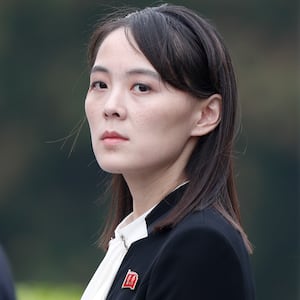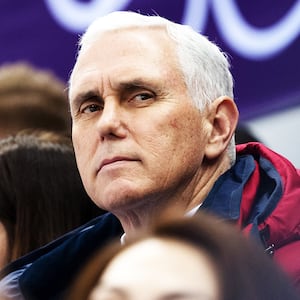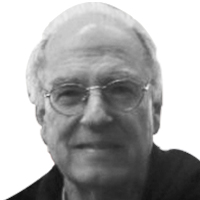SEOUL—As the world waits to see if North Korean leader Kim Jong Un is alive, dead, or somewhere in between at the age of 36, all eyes are turning to his little sister, 31-year-old Kim Yo Jong. She looks like the top contender to succeed him, but does she have what it takes to do that in a regime long characterized by extreme brutality?
She might well.
Kim Yo Jong’s rise within North Korea’s omnipotent Organization and Guidance Department makes her North Korea’s “No. 2” in the eyes of the Workers’ Party bureaucrats—and that makes her not only the most visible heir to Kim Jong Un’s throne but, already, a central figure of authority.
If, as some have reported, Supreme Leader Kim Jong Un is near death after a surgical procedure, Yo Jong may already have the power to fend off any challenges to her claim on leadership.
She makes the decisions on what’s important enough for big brother Kim Jong Un’s scrutiny, says Robert Collins, who’s spent more than 40 years analyzing North Korea.
Collins, author of a lengthy study of the agency at the center of power in the North, says Kim Yo Jong exercises such authority around the OGD as to force party officials “to both fear and respect her.” Evidence that she’s got the job if not the title of OGD first vice director, he says, is that “the North Korean media always mentions her with Party cadre who are serving at that level.”
Kim Yo Jong’s importance at the OGD, which has life-or-death power over the country’s 26 million citizens, adds to the growing impression that she’s been groomed for years to serve as a regent for Kim Jong Un if he’s incapacitated by medical issues or, if he dies, while waiting for his son, a child of about 10, to assume the mantle.
Kim’s condition remains a mystery ever since his absence from view after a session of the rubber-stamp Supreme People’s Assembly on April 12, but there’s no doubt about little sister’s place within the North’s ruling dynasty.
The proof lies in the increasing freedom with which she has been speaking out on policy issues—a privilege she could only have with complete approval if not collaboration from her brother—and that includes her relationship with Donald J. Trump.
Like Kim Jong Un, Yo Jong has sought to forge a relationship with the U.S. president that transcends the failure to come to terms on the North’s nuclear program. It was Yo Jong, not her brother, who reaffirmed last month the “special and firm personal relations” between Trump and Jong Un, and revealed that Trump had written a letter expressing what she said had been “his plan to propel the relations between the two countries.” Only after she’d talked about the letter did Trump acknowledge the letter had been sent.
Kim Yo Jong, as reported by the North’s Korean Central News Agency, expressed her brother’s “intent to render cooperation in the anti-epidemic work” as the novel coronavirus swept across the world. She said Trump had written that he “was impressed by the efforts made by the Chairman to defend his people from the serious threat of the epidemic." This, even though North Korea has yet to acknowledge a single case, much less any deaths, from the disease.
It may well have been this statement by Kim Yo Jong that got Trump to say much later that Kim had sent him “a nice note.” North Korea denied any note was sent, but Yo Jong in her remarks did profess the “friendship” between Trump and her brother, just as big bro would have wanted, while making no concessions on the North’s nuclear program.

Kim Jong Un and sister Kim Yo Jong attend the Inter-Korean Summit at the Peace House on April 27, 2018.
Pool/GettyHer statement carefully hinted at the failure of the talks thus far in verbiage that obviously would meet with her brother’s approval. It was “good judgment and proper action for the U.S. president to make efforts to keep the good relations he had with our Chairman,” she said, “when big difficulties and challenges lie in the way of developing the bilateral relations.” This, she said, “should be highly estimated”—an enigmatic comment suggesting a deal was still conceivable.
“For me, the most important thing about [Trump’s] letter was that it was Kim Yo Jong who acknowledged it rather than the foreign minister or another senior official,” says Evans Revere, a veteran U.S. diplomat here. “The fact that she did so, and the content of her statement, told me she was clearly becoming KJU's go-to person on matters of personal importance to him.”
Revere said he was “quite struck by the fact that in her statement she spoke authoritatively and confidently on behalf of KJU and provided a surprising detailed ‘personal’ analysis of the state of the relationship between KJU and the U.S. president.” Then too, he says, “I was also surprised by her use of the first person in the statement—a rarity in public remarks by senior [North Korean] officials and another indication of her ability to speak on behalf of KJU, but in her own voice.”
Kim Yo Jong’s emergence as a voice of policy on behalf of her brother comes after years in which she has subtly worked her way into a position of power. As early as 2002, Supreme Leader Kim Jong Il proudly told foreign interlocutors that his youngest daughter, Yo Jong, was interested in politics, says Bruce Bennett, North Korea expert at the Rand Corporation. “We know that she has wanted to exercise power and authority in North Korea,” and even wanted to make her career in the country’s “political system.”
Bennett speculates that Kim Yong Jo’s other significant statement, written in early March rebuking South Korea for criticizing the North for one of the short-range missile tests ordered by her brother, may have been written by him but “put out under her name to make her appear prominent.”

Vice President Mike Pence and Kim Yo Jong attend the opening ceremony of the Pyeongchang 2018 Winter Olympic Games.
Odd Andersen/AFP via GettyAs far as anyone can tell, she made no major statements when she debuted internationally by attending the 2018 Winter Olympics in the South Korean mountain town of Pyeongchang. Even when she met the South’s President Moon Jae-in, presenting him with a note from her brother inviting him for a summit, she basically just expressed in passing the hope that the two could meet soon.
Her visit was laden with special significance nonetheless. High-up North Korean officials had certainly visited South Korea on special occasions in the past, but never before had a member of the North’s ruling family set foot in the South.
Her observations about her trip were exceedingly polite—and portentous for North-South rapprochement.
“Honestly, I didn’t know I would come here so suddenly,” she said at a farewell dinner hosted by Moon. “I thought things would be strange and very different, but I found a lot of things being similar. Here’s to hoping that we could see the pleasant people [of the South] again in Pyeongchang and bring closer the future where we are one again.”
Such diplomatic words were more than pro forma. She herself may not be at the stage where she issues policy-making pronouncements, but, “That does not mean that she is powerless,” says Bennett. “The fact that she is one of the very few people who appears able to talk with Kim Jong Un makes her very powerful, though in a kind of shadowy way.”
She has a way of inserting herself into the picture without appearing obtrusive. “When Kim has gone on many of his on-site guidance sessions, she is often shown in the background, not infrequently the distant background,” says Bennett. “She appears intent not to make herself appear to be a rival of Kim Jong Un, and thus face elimination. She is smart, calculating, and who knows how much power she has been able to build working in the shadows?”
Bennett likens Kim’s reticence, until recently, to that of her brother until 2010 when it had become clear their father, Kim Jong Il, was not going to live much longer. “After all, Kim Jong Un played an even more shadowy role until 2010, with no one having even a recent picture of him until then,” says Bennett. “Subsequently, he had over a year to establish himself openly.” Depending on her brother’s health, “Kim Yo Jong may not have anything like that.”
Not that basic policy will change if or when she does gain power, especially if her role is to be that of a regent while Kim Jong Un convalesces. Whatever statements she makes are likely to reflect her brother’s policy regardless of whether he’s medically capable of carrying on.
“If she is KJU's closest confidant,” says Nicholas Eberstadt, long-time North Korea watcher at the American Enterprise Institute, “I would not expect her to pull a Gorby”—a reference to the vast reforms instituted under Mikhail Gorbachev, the last Soviet ruler before the break-up of the Soviet Union almost 30 years ago.
There are, to be sure, no guarantees. Maybe her brother will recover. Maybe he will resent her prominence during his absence—which would be very dangerous for her. Maybe she will never succeed to the top job or serve as regent.
Bob Collins, author of the study on the North’s Organization and Guidance Department, notes that while she is prominent in that crucial body, “She could only be a leader if she was the head of the OGD. Otherwise, she would not have the sufficient power base to seize and hold power.”
Ken Eom, who defected from North Korea after serving 10 years in the North Korean army, is also not entirely convinced of her durability. “She has great power to control the North Korean elite, but if Kim Jong Un is out or dies, she cannot continuously keep power,” he says. “North Korea doesn’t accept woman’s power.”
“This means,” Eom believes, “if Kim Jong Un dies, at the same time Kim Yo Jong also will be out, too.”
For now, supreme power may not be what Kim Yo Jong is after, but the duties of regent would fit “a traditional role that we’ve seen often in East Asia,” says Steve Tharp, like Collins a veteran of decades of military and civilian experience here dealing with North Korean issues. A regent governed in the 19th century, he notes, before the last Korean king, Kojong, was old enough to rule in his own right and before the Japanese took over the country in 1910.
Evans Revere, the former diplomat, senses in her statement about Trump’s letter, though, a power drive that she has difficulty sublimating. “Her self-confidence bordering on cockiness comes through quite clearly in the statement,“ he says, “and she even adopts a patronizing tone in discussing the U.S. president's efforts to build a relationship with her brother.”
And then there was Kim Jong Un’s decision to send her to the 2018 Olympics two years earlier. “It spoke volumes about KJU's confidence in her that he sent her to represent him at the ceremony,” he says.
David Straub, who also analyzed North Korea as a senior U.S. diplomat, believes Kim Yo Jong has a way of conveying what she’s thinking just by her expression. “I’ll never forget when she came to the South Korean Olympics and was seated just behind Vice President Mike Pence,” he says. “Pence was officially and studiously ignoring her, but her eyes! If looks could kill!”



